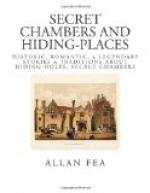A few years after James’s abdication, the Earl of Ailesbury rented the house from the Countess, who lived meanwhile in a small house adjacent, and was in the habit of coming into the gardens of the palace by a key of admittance she kept for that purpose. Upon one of these occasions the Earl and she had a disagreement about the lease, and so forcible were the lady’s coarse expressions, for she never could restrain the licence of her tongue, that she had to be ejected from the premises, whereupon, says Ailesbury, “she bade me go to my——King James,” with the assurance that “she would make King William spit on me.”
[Illustration: MONUMENT OF SIR RICHARD HEAD]
[Illustration: “RESTORATION HOUSE,” ROCHESTER]
But to follow James II.’s ill-fortunes to Rochester, where he was conveyed on the Tuesday at noon by royal barge, with an escort of Dutch soldiers, with Lords Arran, Dumbarton, etc., in attendance—“a sad sight,” says Evelyn, who witnessed the departure. The King recognised among those set to guard him an old lieutenant of the Horse who had fought under him, when Duke of York, at the battle of Dunkirk. Colonel Wycke, in command of the King’s escort, was a nephew of the court painter Sir Peter Lely, who had owed his success to the patronage of Charles II. and his brother. The part the Colonel had to act was a painful one, and he begged the King’s pardon. The royal prisoner was lodged for the night at Gravesend, at the house of a lawyer, and next morning the journey was continued to Rochester.
The royalist Sir Richard Head again had the honour of acting as the King’s host, and his guest was allowed to go in and out of the house as he pleased, for diplomatic William of Orange had arranged that no opportunity should be lost for James to make use of a passport which the Duke of Berwick had obtained for “a certain gentleman and two servants.” James’s movements, therefore, were hampered in no way. But the King, ever suspicious, planned his escape from Rochester with the greatest caution and secrecy, and many of his most attached and loyal adherents were kept in ignorance of his final departure. James’s little court consisted of the Earls of Arran, Lichfield, Middleton, Dumbarton, and Ailesbury, the Duke of Berwick, Sir Stephen Fox, Major-General Sackville, Mr. Grahame, Fenton, and a few others.




